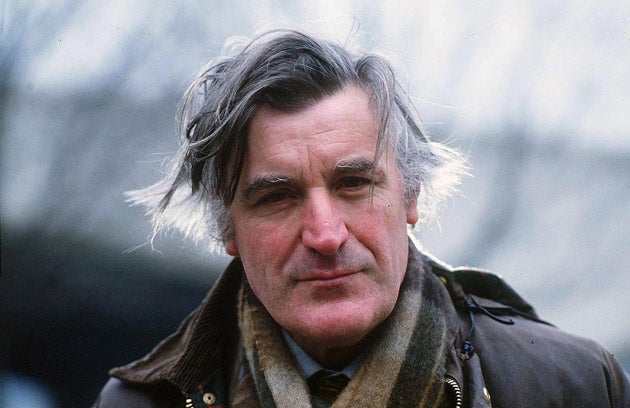Boyd Tonkin: Swansongs for a poet and a queen
The Week In Books

God save the Queen (and the rest of her family) from true-blue loyal monarchists. The royals might get more sympathetic or at least respectful treatment from socialists and republicans. King George V, who set about befriending Labour politicians in the early 1920s at a time when his new ministers came in shades of deep red rather than insipid pink, seems to have agreed.
Last week - as part of The Independent's Woodstock Literary Festival - I interviewed William Shawcross about his official biography of the Queen Mother (reviewed on page 29). For all its somewhat challenging bulk, it casts new light into many unexpected corners of British social history over the century of its subject's life. Naively, as someone uninvolved in royal cults or sects, I imagined it would be welcomed and debated on those grounds.
Silly, silly me. Like rats in a sack, the rabid royalists of one feuding camp or another bared their teeth to pick sides, air grudges and settle scores. Right-wing papers published attacks on the book and the Queen Mother herself of quite stupendous spite. Could it be that faction-fighting ultra-monarchists can no longer tell the difference between the House of Windsor and the House of Big Brother? If so, God save us all.
You might never guess from the past week's storm that Shawcross's life devotes more space to the Queen Mother's relationship with Ted Hughes than with Diana, Princess of Wales. "He was captivated by her," Shawcross reports of their early encounters in the 1980s, "and she by him". "How fortunate I am to have a friend who is a great poet. Lucky lucky me," wrote his royal confidante, who had after all reacted to flunking her exams way back in 1916 by pleading to her governess, "I always was good at poetry wasn't I?!!".
A "great support" as the Queen Mother's grandchildren's marriages foundered through the 1990s, the Poet Laureate in turn experienced her warmth "like a surge from a tremendous battery". Shortly before his death he even explained his sequence about Sylvia Plath, Birthday Letters, to her as "a kind of purging... I felt vastly unburdened". Hughes responded to the sunshine of royal favour with the mystical, romantic monarchism of works such as Rain-Charm for the Duchy. Many critics tend to approach them like a Rothko buff confronted by a Landseer stag.
Hughes's Laureate odes sought to revive the ancient idea of a sacramental monarchy that enshrined the spirit of a land and its people, but in a form that drew its fuel from myths of nature rather than organised religion. To call this a tough task for the 1990s is to put things very mildly indeed. You might as well try to resurrect the Divine Right of Kings. His creative pulse quickened by an admirer who had made herself a national icon, Hughes nonetheless did what many poets have always done.
He went in search of a – non-doctrinal – sense of the sacred at the core of secular institutions or relationships. If he made an old fool of himself, then he won't be the last to stumble so. The British monarchy, soiled and shrunken by its supposed "friends" far more than by reformers and opponents, was surely too far gone by then to clothe itself again in Hughes's golden robes.
Whatever becomes of the Windsors, that poetic impulse will return. Carol Ann Duffy must be thinking hard about the bardic aura that still clings to her role. She opened her account as Laureate with a poem to mark the passing of the last veterans of the First World War: solid ground for a poet who wants to imbue moments of shared commemoration with the unifying grace of art.
Where else in a deconsecrated culture does a writer find figures, events or images that pull us towards them with the gravity of archetypes? British public life sheds authority and legitimacy by the year. So a national poet must hunt for the real thing. Hughes's mythical monarchy might have proved a mistaken or just anachronistic answer; but the question will persist.
P.S.This week, you could still buy from Amazon.co.uk The Lateo Directive and The Umbra Inheritance: two action-packed thrillers by a certain "Hunter Mann Purdy". Both these patriotic-sounding romps star a glamorous enforcer, Mac, doing his damnedest to counter threats to "the British way of life". On Monday it emerged that "Hunter Mann Purdy" – aka Paul Alexander, born Paul Daintry – was doing his own substantial bit to wreck our way of life as an armourer for criminal gangs. He was found guilty of selling weapons from his Essex lair that have been linked to shootings. Perhaps distance lends enchantment to our view of the trade in death, but writing and arms supply once had more a romantic connection. The young Joseph Conrad (left) ran guns to Spanish rebels, and exiled poet Artur Rimbaud sold rifles to a pretender to the Ethiopian crown.
Subscribe to Independent Premium to bookmark this article
Want to bookmark your favourite articles and stories to read or reference later? Start your Independent Premium subscription today.

Join our commenting forum
Join thought-provoking conversations, follow other Independent readers and see their replies